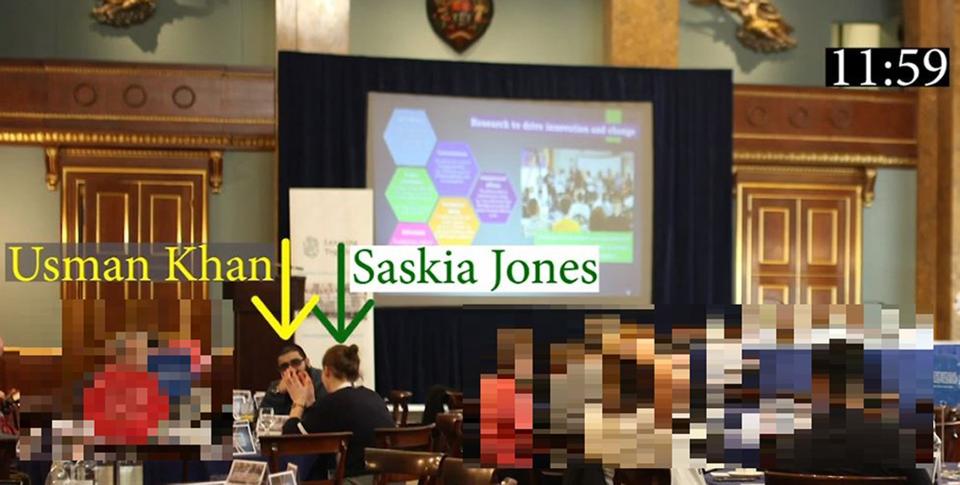Fishmongers’ Hall terrorist was made prison ‘peer mentor’ despite radicalising inmates

Usman Khan at Bank station on his way to Fishmongers’ Hall on 29 November 2019
(Metropolitan Police)A terrorist was made a “peer mentor” to fellow inmates in a high-security jail despite intelligence he was radicalising prisoners and potentially planning an attack, an inquest has heard.
Usman Khan was serving a sentence for preparing acts of terrorism at HMP Whitemoor when he was allowed to join Cambridge University’s Learning Together education programme in 2017.
Two years later he launched a terror attack, murdering two people at an alumni event held at Fishmongers’ Hall in London.
The inquests into their deaths are examining how Khan was allowed to join the Learning Together programme and attend the event on 29 November 2019.
Thursday’s hearing was told that Khan applied to join a creative writing course starting in November 2017, which was run for both university students and inmates of HMP Whitemoor.
On his form, the convict said he was “very interested in creating writing” and circled numbers indicating that he was able to complete necessary tasks such as “building relationships that help me to work with people who seem different to me”.
Khan was allowed onto the course after being interviewed by Learning Together staff and vetted by the prison’s security team.
Dr Amy Ludlow, one of the founders of Learning Together, said she had not been told about Khan’s offending history and prison behaviour at that stage.
Jonathan Hough QC, counsel to the inquests, said that prison intelligence indicated that Khan had a “history linking him to violent incidents, bullying, serious disruption and radicalisation including forced conversions”.
“As recently as July 2017, there was prison intelligence describing him as the main inmate in the area [of the prison] for radicalisation,” he added.
Dr Ludlow said she was not given that information and believed it would have been taken into account by prison officials who allowed him to join the course.

“I trusted that colleagues in Whitemoor knew about those behaviours and made the decision it was safe for him to work with us,” she added.
The inquests heard that Khan was a “high-risk” category-A prisoner at the time, indicating that he was unusually dangerous. Prisoners in this category account for less than 0.1 per cent of the prison population.
Dr Ludlow said no categories of inmate were automatically excluded from Learning Together and that other terror offenders have taken the course.
Khan completed a creative writing course and did further courses within the programme, on education, criminal justice and probability.
In late 2018 he became a “peer mentor” for the probability course. Dr Ludlow said the post involved providing “informal support and encouragement” to inmates during lessons and on the wings.
Mr Hough said that by the time of Khan’s release on 14 December 2018, there was “intelligence indicating that he intended to return to extremism and may attempt an attack”.
Dr Ludlow said she was not told of the concerns, and was not worried by an essay that Khan wrote shortly before his release.
The essay was entitled “A study of radicalisation in modern Europe” and claimed to highlight the “real fuel of radicalisation and extremism”.

Khan wrote that most research had “missed the route of radicalisation/extremism, which is personal injustices and grievances found by individuals on a daily basis”.
Mr Hough asked whether the essay could be read to justify terrorist radicalisation, but Dr Ludlow said it was consistent with other research evidence, adding: “There was nothing that alarmed me about it.”
Reverend Paul Foster, chaplain for HMP Whitemoor, said Khan had also taken part in a victim awareness course.
He wrote a report in December 2018, shortly before Khan was freed, describing him as motivated and saying he “engaged extremely well with his index offence of terrorist offences”.
“Usman was able to show empathy towards victims,” the report added. “He also recognises the impact his index offence had on the community, both in general and the Muslim community.”
Rev Foster said Khan had also “displayed a willingness to learn all aspects of the Islamic faith properly” and was engaging with an imam inside jail.
He told the inquests that he was not informed of the intelligence on Khan’s activities during the period, including radicalising other prisoners and possibly planning an attack.
“If that intelligence is correct, he was obviously presenting himself in a way that was likely to deceive the likes of myself and others,” the chaplain added. “I'm open to say I am wrong, and it is possible I have been conned.” The inquests continue.
Read More
Fishmongers’ Hall terrorist identified as threat by MI5 11 days before attack, court hears

